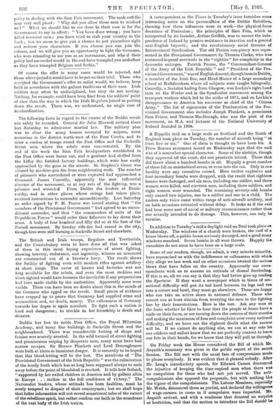Dublin has lost its noble Post Office, the Royal Hibernian
Academy, and many fine buildings in Sackville Street and the neighbourhood. There was considerable looting of shops and famine was scarcely averted. In the wild turmoil of street fighting and promiscuous sniping by desperate men, many must have had narrow escapes. Sir Horace Plunkett and Lord Donoughmore wore both at times in imminent danger. It is earnestly to be hoped that this blood-letting will be the last. The manifesto of " The Provisional Government of the Irish Republic " was the culmination of the wordy froth which has so long been supposed always to melt away before the point of bloodshed is reached. It tells how Ireland, " supported- by her exiled children in America and by gallant allies in Europe . . strikes in the full confidence of victory.? The Nationalist leaders, whose attitude has been faultless, must be sorely tempted to despair of their countrymen; but we shall hope that fuller information will not reveal sensational tales of the extent of the rebellious spirit, but rather confirm our faith in the soundness of the vast body of tho Irish nation. A correspondent of the Times in Tuesday's issue furnishes some interesting notes on the personalities of the Dublin Rebellion. showing how three influences were at work—the physical-force doctrines of Fenianism ; the principles of Sian Fein, which as interpreted by its founder, Arthur Griffith, was to ensure the inde. pendence of Ireland by passive resistance to taxation and a general anti-English boycott ; and the revolutionary social theories of International Syndicalism. The old Fenian conspiracy was repre- sented in the Provisional Government by Thomas Clarke, who was sentenced to penal servitude in the " eighties " for complicity in the dynamite outrages. Patrick -Pearse, the " Commandant-General of the Army of the Irish Republic " and "President of the Pna- visional Government," was of English descent, though born in Dublin, a member of the Irish Bar, and Head-Master of a large secondary school at Rathfarnham whore all subjects were taught bilingually, Connolly, a Socialist hailing from Glasgow, was Larkin's right-hand man on the Worker and in the Syndicalist movement among the transport workers which led to the strike of 1913, and on Larkires disappearance to America his successor as chief of the " Citizen Army." The list of signatories of the •Proclamation of the Pro- visional Gevernment also includes Joseph Plunkett, a prominent Sinn Feiner, and Thomas MacDonagh, who was the poet of the movement, an M.A. and lecturer of the National University of Ireland founded in 1908.






























 Previous page
Previous page